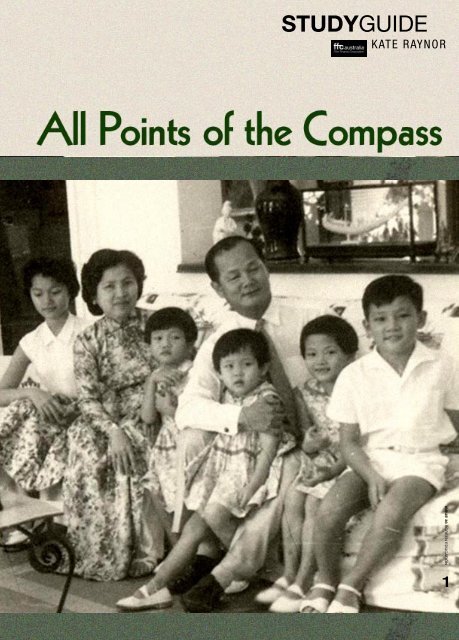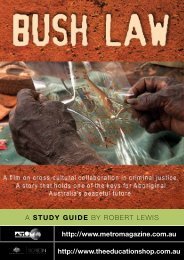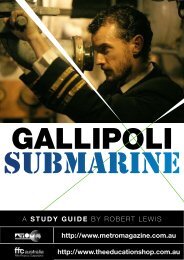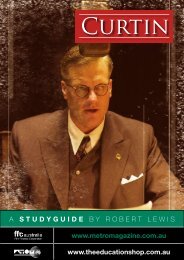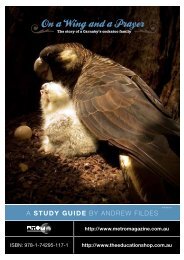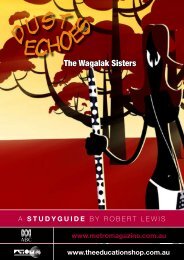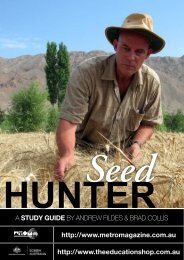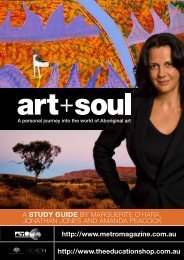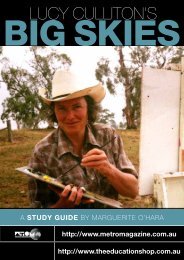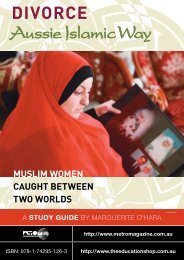Download - ABC Commercial
Download - ABC Commercial
Download - ABC Commercial
You also want an ePaper? Increase the reach of your titles
YUMPU automatically turns print PDFs into web optimized ePapers that Google loves.
STUDYGUIDE<br />
KATE RAYNOR<br />
ISSUE 36 SCREEN EDUCATION<br />
1
“Some of us are born in peacetime, some are born in wartime.<br />
The unlucky ones experience the smoke and fire of war, feel<br />
the misery of mourning for loved ones, and endure wrenching<br />
social and political changes. I belong to this unlucky group.”<br />
Tran Van Lam, 1913–2001<br />
ISSUE 36 SCREEN EDUCATION<br />
2<br />
Introduction<br />
ALL POINTS OF THE<br />
COMPASS is a testament<br />
to the enduring<br />
bonds of family.<br />
Against a backdrop of<br />
uncertainty and political<br />
instability, Tran Van Lam, South<br />
Vietnam’s Foreign Minister during the<br />
Vietnam War, fathered nine remarkable<br />
children who have set out to all<br />
points of the globe. This documentary<br />
chronicles the Tran diaspora, exploring<br />
the key socio-political events against<br />
which this one family’s history unfolds.<br />
It is ultimately a very moving tribute to<br />
a man who endured great losses and<br />
disappointments with remarkable dignity<br />
and integrity. His powerful legacy<br />
is to be seen in his adult children, with<br />
their ongoing commitment to the need<br />
for decency and personal responsibility<br />
in the world. The stories circle<br />
around migration, assimilation, intergenerational<br />
loyalties and conflicts,<br />
and multiculturalism. Each member of<br />
the Tran family contributes their own<br />
particular perspective on the nature<br />
of identity and family, in a documentary<br />
that makes rich and poetic use of<br />
home movie footage, newsreels and<br />
interviews.<br />
Curriculum links<br />
All Points of the Compass will be of<br />
interest to senior secondary SOSE<br />
students. It may also have application<br />
in Media Studies and English.<br />
Director’s statement<br />
The Vietnam War was my war and<br />
I have always been very sure of my<br />
position on it: Nixon lied to South<br />
Vietnam and ultimately betrayed them.<br />
Nothing has changed with the passing<br />
of time but I guess, like everyone else<br />
in this sordid war, I did not pay enough<br />
attention to the South Vietnamese<br />
– our allies. As a young filmmaker, I<br />
went to Malaysia to film the wretched<br />
plight of the boat people arriving on<br />
beaches or, worse still, being turned<br />
back to sea; but I didn’t really ask how<br />
this had happened to South Vietnam<br />
when their ally was one of the two<br />
most powerful countries in the world.<br />
Two years ago, a woman called<br />
Therase Tran walked into Bevan<br />
Childs’ and my life, saying she thought<br />
there might be a story in her family. As<br />
a filmmaker, I often have this experience<br />
and I dread it. She did mention<br />
a very interesting aspect to her idea,<br />
however: her father was a film buff<br />
and had shot film of her family as they<br />
grew up in 1950s Saigon. I thought<br />
it would be a good idea to look at<br />
the films. After I’d seen the footage I<br />
was hooked. Then I read about Tran<br />
Van Lam and realized that we had a<br />
marvellous new take on a story that<br />
has jerked from one lie to the next for<br />
thirty years. And our man was honest<br />
and honourable.<br />
The Tran family made their decision<br />
to make the film with us through the<br />
typical dynamics the family employs<br />
to make all family decisions: a lot of<br />
discussion intra-family and then we<br />
had to meet Mai, the oldest daughter,<br />
who would make the decision on the<br />
family’s behalf. Luckily, Mai gave us<br />
the nod.<br />
The Tran family have led me, and I<br />
hope the audience, to re-examine the<br />
position of the South Vietnamese in<br />
the Vietnam War. With the benefit of<br />
new documents coming to light, one<br />
can clearly see the duplicitous nature<br />
of the American juggernaut at the<br />
highest levels. Most importantly, the<br />
openness and candour of the family<br />
members gives us all an opportunity<br />
to appreciate and gain insight into the<br />
lives of individuals tossed randomly<br />
around the globe by the capriciousness<br />
of warmongers.<br />
—Judy Rymer<br />
The Tran family children<br />
1 Mai<br />
2 Elise<br />
3 Agnes<br />
4 Paul<br />
5 Lucie<br />
6 Marie<br />
7 Therase<br />
8 Bosco<br />
9 Patrick
ISSUE 36 SCREEN EDUCATION<br />
3
ISSUE 36 SCREEN EDUCATION<br />
4<br />
Activities and discussion<br />
points<br />
Immigration,<br />
multiculturalism and<br />
identity: new lives in<br />
foreign lands<br />
• How many South Vietnamese<br />
refugees came to Australia during<br />
the 1970s?<br />
• Using census information, what<br />
can you find out about the ethnic<br />
backgrounds of the Australian<br />
population in 2005? Present your<br />
discoveries in a visual/graphic<br />
format.<br />
• Describe your ethnic background.<br />
• List six advantages that Australia<br />
has reaped from immigration.<br />
• Tran’s wife blamed him when one<br />
of their children, Agnes, married a<br />
foreigner. She felt that the children<br />
were losing their sense of their<br />
culture, and she cried throughout<br />
the wedding. Mai, Tran’s eldest<br />
daughter, has raised her daughter<br />
in America and wonders how you<br />
can instill Asian values in children<br />
born and reared in Western<br />
countries. What does it mean to<br />
assimilate into another culture?<br />
What can you do to preserve your<br />
sense of cultural background while<br />
fitting into a new country?<br />
• Debate topic: ‘Assimilation means<br />
cutting ties with the past’.<br />
• Patrick observes that you adapt to<br />
fit with the people whom you live<br />
amongst. Do you agree? How do<br />
you think you might change if you<br />
had to live in a foreign country for<br />
any length of time? What aspects<br />
of your identity do you believe are<br />
immutable?<br />
• What does ‘multiculturalism’<br />
mean?<br />
• Therase believes that belonging<br />
to the Australian community and<br />
adapting to the Australian way<br />
of life, all the while maintaining a<br />
sense of her Vietnamese cultural<br />
heritage, has enabled her to reach<br />
her own personal objectives. She<br />
believes this is the true meaning<br />
of multiculturalism. Discuss her<br />
definition of this complex term.<br />
• Enter ‘multiculturalism in Australia’<br />
on an Internet search engine.<br />
Choose an article and present your<br />
analysis of it to the class.<br />
• Mai notes she was happy to abandon<br />
certain aspects of traditional<br />
life: ‘And some of us also make a<br />
choice. Do we really want some<br />
of these very Asian values and<br />
beliefs, or don’t we? Certainly one<br />
that I have completely abandoned<br />
is the submissiveness of women’.<br />
What might Mai and her sisters’<br />
lives have been like if they had not<br />
been educated in the West and<br />
had instead remained in Vietnam?<br />
Do you think that Mai was able to<br />
make certain choices about her<br />
values and lifestyle because of her<br />
independence from her parents?<br />
• Eldest son Paul is now a maxillofacial<br />
surgeon in Glasgow. He<br />
says: ‘Sometimes I don’t even<br />
think I’m Vietnamese’. He forgets<br />
about his background in the rush<br />
of everyday life. He talks about a<br />
current shift in attitudes towards<br />
asylum seekers and says that he<br />
worries about his children, Richard<br />
and Cathy, and the possibly hostile<br />
world that they will enter after<br />
their schooling. Born in Scotland,<br />
they have an Irish mother and a<br />
Vietnamese father. They don’t<br />
consider themselves Vietnamese,<br />
but then what are they? The film<br />
offers many examples of these<br />
racial melting pot identities. What<br />
might be gained and what lost by<br />
the sort of ambiguity experienced<br />
by Paul’s children? How important<br />
is it to be able to define where you<br />
come from?<br />
• Lucie is a French citizen, working<br />
in West Africa for the World Bank<br />
as an agricultural analyst. She says<br />
that a lot of people working for<br />
the World Bank don’t feel at home<br />
anywhere; they share a sense of<br />
displacement. While her mother<br />
would have happily kept all the<br />
children in Vietnam to preserve<br />
their culture, her father gave her<br />
a sense of the bigger world out<br />
there, a broader perspective.<br />
She hasn’t settled anywhere, just<br />
keeps roaming the globe; but now,<br />
as she gets older, she wonders<br />
where she will be buried. Where is<br />
your home? What does it mean to<br />
you? Where would you like to be<br />
buried?<br />
• What does it mean to have a sense<br />
of place? Write an account of a location<br />
that has special significance<br />
for you and your family (for example,<br />
your family home, a holiday<br />
destination, a grandparent’s grave<br />
site).<br />
• How important is it to know where<br />
you have come from?<br />
• What or who makes you feel like<br />
you belong?<br />
• Mai spoke French at her primary<br />
school in Vietnam: Vietnamese<br />
was taught as a foreign language<br />
and the students were expected<br />
to speak French at all times.<br />
Lucie’s daughter Lisa has lived in<br />
France all her life. She considers<br />
herself French and doesn’t speak<br />
any Vietnamese. Her husband is<br />
Italian and her son is being raised<br />
in England. Therase tried to teach<br />
her daughters Vietnamese, but<br />
at school they learnt Italian and<br />
Mandarin and it has become one<br />
linguistic muddle. How important<br />
is language to identity?<br />
• The fall of Saigon meant the loss<br />
of the Tran home. Lucie talks of<br />
‘not knowing who you’re going to<br />
turn into’. List three key influences<br />
on your sense of personal identity.<br />
Where do you get your identity<br />
from? Who do you think you will<br />
turn into? Why do you believe this?<br />
• Tran told Bosco that to succeed in<br />
a foreign country, you must excel.<br />
Do you think this is true? Why or<br />
why not?<br />
• What were the Vietnamese ‘reeducation<br />
camps’ Lucie refers to?<br />
• How has Australia’s immigration<br />
policy changed in the years since<br />
Tran and his wife arrived in Australia?<br />
• Has the treatment of asylum<br />
seekers improved in the last thirty<br />
years?<br />
• Tran was granted asylum in Australia<br />
by the Whitlam Government<br />
with a condition attached: ‘I, Tran<br />
Van Lam, solemnly declare that if<br />
admitted to Australia for permanent<br />
residence I will not engage in<br />
political activity of any kind and I<br />
will not permit my name to be lent<br />
to or associated with any such<br />
prohibited activity’. Why might
ISSUE 36 SCREEN EDUCATION<br />
5
ISSUE 36 SCREEN EDUCATION<br />
6<br />
the Australian government have<br />
felt such a condition was necessary?<br />
(On 18 February 1976, Tran<br />
received a letter from Parliament<br />
House rescinding the condition: ‘…<br />
the [Fraser] government considers<br />
it inappropriate for you to be required<br />
to sign that undertaking …<br />
the government has decided that<br />
the undertaking will no longer be<br />
binding upon you. The document<br />
will be cancelled and your continued<br />
residency in Australia will be<br />
entirely unconditional in respect to<br />
its contents’.)<br />
• Tran never made it back to Vietnam.<br />
What does it mean to be in<br />
exile from one’s homeland?<br />
Vietnam: socio-historical<br />
context<br />
• Divide the class into groups of<br />
four. Assign each group a research<br />
field on the topic of Vietnam, for<br />
example, culture (food, dress,<br />
music, dance, art), history, geography,<br />
industry, the war. Each group<br />
presents a report on its findings to<br />
the class.<br />
• Vietnam has become an increasingly<br />
popular tourist destination<br />
among Western travellers. Visit a<br />
tourist web site and collect some<br />
travel brochures, noting the key<br />
features of the area that are promoted.<br />
Vietnam: war and peace<br />
Tran: I don’t consider the revolutions<br />
in Russia and China to be successes,<br />
given their huge costs in human lives<br />
and in people’s pride, dignity and<br />
personal freedom … Independence<br />
without freedom, peace and prosperity<br />
is not enough.<br />
• Tran notes that ‘we had lost our<br />
country for over eighty years … I<br />
felt ashamed of being a citizen of a<br />
colonized nation’. The documentary<br />
mentions that during the twentieth<br />
century, Vietnam was colonized<br />
by the Chinese, French, Japanese<br />
and British. Using the Internet and<br />
resources available in your library,<br />
compile a brief account outlining<br />
the terms of these various colonial<br />
rules. What influences did each of<br />
these countries have on the culture<br />
of Vietnam? Discuss what it means<br />
to be a colony, with reference to<br />
Australia’s colonial past.<br />
• Construct a timeline indicating the<br />
key dates and events of the Vietnam<br />
War. When were: the fall of<br />
Saigon; the Tet offensive; the Paris<br />
peace talks?<br />
• Write brief profiles of Ho Chi Minh<br />
and President Thieu.<br />
• John F. Kennedy’s fear of Indo-<br />
China precipitating a ‘domino<br />
collapse’ to the ‘Reds’ was<br />
replaced by concern about public<br />
reaction to the mounting death<br />
toll of US soldiers. When Lyndon<br />
Johnson resigned, Richard Nixon<br />
was elected partly on the promise<br />
of a negotiated peace in Vietnam.<br />
Explain the ‘domino’ theory which<br />
led to US intervention in the region.<br />
How important was the War in<br />
terms of US domestic politics?<br />
• Why was the Tet offensive a turning<br />
point in the War?<br />
• Images of terrible civilian and<br />
military casualties fuelled public<br />
protests in America. What can you<br />
find out about media coverage of<br />
the war, particularly on television?<br />
• Many political commentators have<br />
likened US intervention in Iraq to<br />
the country’s involvement in the<br />
Vietnam war. What similarities and<br />
differences can you identify?<br />
• The Paris peace talks took shape<br />
around a ten point plan proposed<br />
by the North. Can you find out<br />
anything about the substance of<br />
this plan?<br />
• Discuss the following statement by<br />
Henry Kissinger, then US Secretary<br />
of State: ‘As far as Saigon is<br />
concerned, it is, of course, entitled<br />
to participate in the settlement of a<br />
war fought on its territory’.<br />
• During the peace talks, America,<br />
represented by Kissinger, entered<br />
secret negotiations with North<br />
Vietnam’s Le Duc Tho. The South<br />
was not to learn of these dealings<br />
for another four years. South<br />
Vietnam’s President Thieu received<br />
thirty-one letters from Presidents<br />
Nixon and Ford guaranteeing<br />
military and economic aid should<br />
the North remain in the South. With<br />
such absolute guarantees from<br />
the presidents of the most powerful<br />
country in the world, Thieu<br />
formulated the South Vietnamese<br />
approach to the Paris peace talks,<br />
assuring South Vietnam it could<br />
depend on the ongoing support of<br />
the US. In 1973, on Thieu’s instructions,<br />
Tran Van Lam sought and<br />
received assurance from Kissinger<br />
that the promises declared by<br />
Nixon in his letters would be honoured.<br />
Having received Kissinger’s<br />
promise of support, Tran signed<br />
the Paris Peace Accords. North<br />
Vietnamese troops remained in<br />
South Vietnam in contravention of<br />
the Paris peace agreement. Tran<br />
had trusted America to defend the<br />
South from attack by the Communist<br />
North, but his trust was<br />
misplaced, with the US abandoning<br />
the concerns of its ally. US<br />
withdrawal resulted in the advance<br />
of the North Vietnamese and, on<br />
30 April 1975 Saigon fell to the<br />
Communists. With the fall of Saigon,<br />
Tran lost his home, his livelihood,<br />
his country and his identity.<br />
Given these facts, do you think<br />
Tran had reason to feel betrayed<br />
by America? What might he have<br />
said to Nixon if the opportunity had<br />
presented itself? How did America<br />
represent its withdrawal and its<br />
lack of support for the South during<br />
this time?<br />
• One South Vietnamese diplomat,<br />
Bui Diem, a former ambassador<br />
to the US, says that the South<br />
Vietnamese had to live with the<br />
consequences of American policy:<br />
‘For the Americans, it is a chapter<br />
in American history. They call it<br />
“honourable peace”. They turn the<br />
pages, but the South Vietnamese<br />
have to suffer the consequences of<br />
it. And you have seen the consequences<br />
of it’. If the Tran family<br />
had stayed in Vietnam after the fall<br />
of Saigon, they would probably<br />
have been killed by the Communists.<br />
What implications did<br />
the withdrawal of US troops have<br />
for the people of South Vietnam?<br />
What can you find out about the<br />
fate of the South Vietnamese who<br />
were unable to flee?<br />
• In one of his speeches at the
time of the US withdrawal from<br />
Vietnam, President Richard Nixon<br />
used the phrase ‘peace with honour’.<br />
What did this mean?<br />
• Discuss the following quote from<br />
Nixon: ‘A nation cannot remain<br />
great if it betrays its allies and lets<br />
down its friends ... The greatest<br />
honour history can bestow is the<br />
title of peacemaker. This honour<br />
now beckons America. If we succeed,<br />
generations to come will say<br />
of us now living, that we mastered<br />
our moment, that we helped make<br />
the world safe for mankind. This<br />
is our summons to greatness ... I<br />
think history will record this may<br />
have been one of America’s finest<br />
hours’.<br />
• Tran was air lifted off the roof of<br />
the US embassy. What thoughts<br />
might have gone through his mind<br />
during this experience? Imagine<br />
you are Tran, caught up in these<br />
historic events, torn by your sense<br />
of loss for your country. A letter<br />
he wrote to one of his sons at this<br />
time began, ‘My dear son, today is<br />
the saddest day of my life …’ Write<br />
an account from Tran’s perspective<br />
of these moments, and of the traumatic<br />
journey away from Vietnam.<br />
Biographical details of Tran<br />
Van Lam<br />
30 July 1913: Born<br />
1954: Elected Governor of South<br />
Vietnam<br />
1956: Elected President of the Constituent<br />
Assembly<br />
1957: Speaker of the National Assembly<br />
1961–63: Ambassador to Australia and<br />
New Zealand<br />
1969–73: Minister for Foreign Affairs<br />
Republic of Vietnam.<br />
January 1973: Signing of the Paris<br />
Peace Agreement<br />
March 1973: The end of US military<br />
involvement in South Vietnam<br />
1974–75: President of the Senate<br />
Republic of Vietnam<br />
29 April 1975: Airlifted off the roof of<br />
the American Embassy<br />
30 April 1975: Fall of Saigon<br />
6 July 1975: Granted asylum in Australia<br />
2001: Died<br />
Tran: an honourable life<br />
• Tran served as Vietnam’s first<br />
ambassador to Australia in the<br />
early 1960s. What duties might this<br />
position have entailed?<br />
• What personal qualities does a<br />
diplomat need?<br />
• Tran: ‘It is often said that people<br />
are born with a predestined fate. I<br />
don’t really believe it. I believe that<br />
we influence our own destinies<br />
greatly, within limits set by the time<br />
and circumstances of our own<br />
birth’. Do you believe in destiny?<br />
Explain your position; what have<br />
you observed or experienced that<br />
has led to this opinion? What can<br />
you do to influence your own fate?<br />
What are the limits of your time<br />
and circumstances?<br />
• Tran believed an honourable life<br />
was a life of service. His daughter<br />
Therase notes that his ‘biggest<br />
fault was that he actually thought<br />
everybody started from the same<br />
premise of integrity’. He says:<br />
‘I rarely declined a position or a<br />
responsibility that I believed was<br />
worthwhile ... I have always carried<br />
with me a lesson that one of my<br />
primary school teachers taught<br />
me: failure is when you do not dare<br />
to act, not when you do’. Write a<br />
statement of principle or belief that<br />
guides your actions and decisions.<br />
How did you arrive at this principle?<br />
• Tran had a saying: ‘If your house<br />
has no roof, life still goes on’. What<br />
do you think this means?<br />
Family values<br />
• Tran and his wife tried to instil in<br />
their children a sense of duty and<br />
responsibility to Vietnam. How<br />
strong a part does a sense of your<br />
country play in your family’s life?<br />
• Lucie says: ‘My childhood was<br />
pure bliss. I was always surrounded<br />
by family, my parents were<br />
there, all the brothers and sisters<br />
were there, it was complete, a<br />
sense of true belonging – it was<br />
very hard to recoup later’. Write an<br />
account of your childhood, noting<br />
key relationships, events and<br />
places, and attempting to capture<br />
some sense of the tone and mood<br />
of your childhood experiences.<br />
What aspects of your family of<br />
origin would you like to replicate<br />
in your adult life? What aspects<br />
of your family of origin might you<br />
hope to distance yourself from?<br />
• We see footage of Tran family holidays<br />
at Cap St Jacques, a beach<br />
resort an hour and a half drive from<br />
Saigon. Tran, a man who met with<br />
Kissinger and Nixon to discuss<br />
and decide the fate of his country,<br />
builds sand castles with his children.<br />
These are precious memories<br />
for the Tran children. Describe<br />
a special memory you have of a<br />
childhood holiday with your family.<br />
• Bosco says he finds himself teaching<br />
his children some of what his<br />
father taught him. What would you<br />
like to pass on from your parents<br />
to any children you might have?<br />
• In the late 1960s, there were half a<br />
million US troops on the ground in<br />
Vietnam. The Tran children returned<br />
to Vietnam each summer to<br />
holiday in a war zone. The children<br />
experienced nightly curfews and<br />
they recall the sounds of gunfire,<br />
helicopters and bombs. In a letter<br />
to Paul while he was studying<br />
medicine in Australia, Tran said<br />
the boy should be ashamed to be<br />
living in a peaceful country while<br />
everyone at home was fighting a<br />
war; it was only acceptable because<br />
he was studying to improve<br />
the country’s future. We see old<br />
photos of the youngest boys playing<br />
with guns: ‘I didn’t think I was<br />
in a danger zone. I thought that<br />
was part of normal life’. What does<br />
‘normal life’ mean to you? What<br />
can you take for granted about<br />
growing up in a peaceful country<br />
such as Australia?<br />
• Mai’s daughter, Mai-Trang, has<br />
grown up thinking one of life’s<br />
key aims is to be happy. That was<br />
not central to Mai’s upbringing,<br />
where much greater emphasis<br />
was placed on civic and familial<br />
responsibility. The right of the<br />
individual to pursue happiness is a<br />
tenet of modern Western societies;<br />
it’s even enshrined in the US<br />
constitution. Essay topic: ‘The<br />
pursuit of happiness might actually 7<br />
ISSUE 36 SCREEN EDUCATION
ISSUE 36 SCREEN EDUCATION<br />
8<br />
make its attainment more difficult’.<br />
Discuss.<br />
• After they migrated to Australia,<br />
Tran and his wife opened a coffee<br />
shop and their youngest boys<br />
continued their schooling. The<br />
older children had to make new<br />
lives for themselves in foreign<br />
countries. Mai, at twenty-one,<br />
based in Washington, was responsible<br />
for four of her sisters. Paul,<br />
the eldest son, sent money to<br />
Australia to help with the education<br />
of his youngest brothers. His<br />
father repeatedly reminded him of<br />
his responsibilities as the eldest<br />
son. During the filming of the<br />
documentary, we learn that Paul<br />
has helped to buy one of his less<br />
prosperous siblings, Marie, an<br />
apartment – they’ve all ‘chipped<br />
in’. Despite being scattered around<br />
the world, the Trans demonstrate<br />
a deep commitment to the belief<br />
that the family is there to help each<br />
of its members. Do you think this<br />
belief is more pronounced in Asian<br />
cultures than in Western society?<br />
How do the parents inspire such<br />
dedication and loyalty in their<br />
children? Do you feel your siblings<br />
would come to your aid if you ever<br />
needed help?<br />
• Make a list of five advantages and<br />
disadvantages of belonging to a<br />
large family.<br />
• While the eldest child Mai was<br />
overseas, Tran made films of the<br />
children singing and dancing to<br />
send to her in America. Describe<br />
something special that a family<br />
member did for you at a difficult<br />
time in your life.<br />
An overseas education: ‘All<br />
of his children blown to the<br />
winds …’<br />
In 1956, Tran was Governor of South<br />
Vietnam. It was a time when the<br />
sons of politicians were at risk of<br />
kidnapping. When a grenade blew<br />
up under Tran’s car, he decided to<br />
send the children away. Mai was<br />
the first to leave; a gifted pianist at<br />
fifteen years of age, she was sent<br />
to America. Next was Agnes, sent<br />
to New Caledonia to a boarding<br />
school where she lived unhappily<br />
for two years. Therase followed<br />
Mai and Elise to America. She<br />
says, ‘It was intensely lonely. I<br />
was the only Asian in the school’.<br />
Sometimes she would go a year<br />
or two without seeing her parents.<br />
Paul was educated at a Christian<br />
Brothers School in Australia, where<br />
a teacher struck him on the head<br />
with a ruler because he didn’t<br />
understand English. At the age of<br />
eight, Lucie was sent to a convent<br />
school in Goulburn, NSW. She<br />
says that her sense of security<br />
quickly disappeared; she came to<br />
the realization that you have to rely<br />
on yourself to survive. Everyone<br />
who left wrote to those remaining<br />
behind in Vietnam, saying how<br />
they missed the family; but each<br />
of them managed to deal with the<br />
sense of separation and loneliness<br />
by focusing on their (or their<br />
father’s?) ultimate purpose.<br />
• How do the Trans’ experiences of<br />
schooling differ from your experiences?<br />
• Write an account of a time in which<br />
you felt lonely.<br />
• Write an account of an experience<br />
that made you feel like an outsider.<br />
• Do you have a sense of the purpose<br />
of your life? Does it differ<br />
from your parents’ ideas?<br />
• Mai claims she was not served well<br />
by her sheltered boarding school<br />
education. What do you think she<br />
means by this? Do you feel your<br />
educating is equipping you for<br />
adult life?<br />
• Therase says it was important to<br />
their father ‘not just [that they] get<br />
educated and make money, but<br />
[that they] do something with it’.<br />
Tran saw education as a means<br />
to serve the community, and tried<br />
to instil in his children a belief that<br />
education carries an obligation to<br />
service. In point form, outline the<br />
education received by your parents<br />
and grandparents. How important<br />
is formal education to your family?<br />
• Tran hoped his nine children would<br />
eventually return from the West to<br />
serve their country. None of them<br />
now lives in Vietnam, and as one<br />
of the daughters comments, if they<br />
return, it will be as tourists. Do you<br />
think this would be a source of<br />
disappointment to Tran?<br />
A study of family<br />
• Construct a family tree.<br />
• Interview an elderly relative or<br />
friend and find out what their<br />
childhood was like. What are their<br />
strongest memories?<br />
• Interview a sibling and compare<br />
their thoughts about family with<br />
your own. How different are your<br />
impressions of family life and your<br />
childhood? What factors might account<br />
for these differences?<br />
• In what ways does your family<br />
influence your identity?<br />
• Write a biography of a member of<br />
your family and present it to the<br />
class.<br />
• Interview the oldest member of<br />
your family. What does family<br />
mean to them? What was important<br />
to their family? What was their<br />
childhood like? Present your findings<br />
to the class.<br />
• What is the best thing about your<br />
family? What is the worst thing<br />
about your family? What makes<br />
your family different from other<br />
families you know?<br />
• All families have experiences that<br />
change their members. Describe a<br />
major event that shaped your family.<br />
• Describe the ‘times’ into which<br />
you were born. What have been<br />
the key political events of your<br />
lifetime?<br />
• List three similarities and three differences<br />
between your family and<br />
the Trans.<br />
• One of the Tran daughters describes<br />
their grandmother as a<br />
simple woman who cared for<br />
everyone and respected everyone’s<br />
points of view. In two or<br />
three sentences, describe each of<br />
your grandparents and their place<br />
in your family.<br />
• Patrick says he was his mother’s<br />
favourite child. Have you ever felt<br />
that either of your parents favours<br />
one of your siblings?<br />
• Patrick also says that as the<br />
youngest he had to contend with<br />
a lot of advice from his many siblings.<br />
How significant is birth order<br />
in shaping personality? Write an
account of a piece of advice you<br />
have been given by a sibling or<br />
cousin, and of the effect it has had<br />
on you.<br />
• Patrick and Bosco both say they<br />
think they were spoilt, treated like<br />
family pets. What does it mean to<br />
spoil a child?<br />
• Patrick misses his parents and<br />
regrets that as the youngest, he<br />
hasn’t had the opportunity to prove<br />
to his father that he can be as successful<br />
as his more established,<br />
older brothers and sisters. Is there<br />
anything you would like to prove<br />
to your parents? How important is<br />
your parents’ approval to you?<br />
• Patrick says his interest in fitness<br />
comes from his father, who saw<br />
exercise as an important part of his<br />
mental discipline. What interests<br />
have you inherited from your parents?<br />
• Therase recounts hiding under<br />
a table during the Tet offensive<br />
bombing. As she puts it, all the<br />
women under the table were preying<br />
to their various deities, her<br />
grandmother to Buddha, Chi Tam,<br />
Patrick’s nurse, to her god, and her<br />
mother clutching her rosary beads.<br />
Describe the methods two of your<br />
family members use to deal with<br />
difficult and stressful situations.<br />
• Bosco notes that his father never<br />
said much about the loss of his<br />
country; despite his sense of<br />
betrayal, he was very circumspect<br />
and diplomatic in his comments<br />
about the American withdrawal.<br />
Bosco’s mother, however, was very<br />
open about her pain and sad to<br />
have her children scattered around<br />
the globe. From this brief observation,<br />
we gather a sense that his<br />
parents had very different emotional<br />
styles and different methods of<br />
dealing with their life experiences.<br />
Describe an incident in your family<br />
that highlights a dramatic contrast<br />
between two family members.<br />
• After the fall of Saigon, Tran settled<br />
in Canberra, having been issued<br />
a temporary visa which he had to<br />
have stamped every three months:<br />
alien status. Tran’s daughter says<br />
he didn’t say anything when she<br />
arrived to pick him up from the<br />
refugee camp. She says she had<br />
never seen him cry before. Describe<br />
an experience where you<br />
have been struck by the emotion<br />
of one of your parents.<br />
• Patrick was born in 1963, and for<br />
one brief moment the family was<br />
complete and all together. It would<br />
be another twenty-seven years<br />
until they would be reunited at their<br />
parents’ fiftieth wedding anniversary.<br />
Describe an occasion in your<br />
family’s history when you were<br />
all gathered together to celebrate<br />
or commemorate something of<br />
importance.<br />
• In one letter, Tran notes his pride<br />
that all of his children are growing<br />
into decent, honest people. What<br />
makes your parents proud of you?<br />
What qualities do your parents<br />
hope you will embody as an adult?<br />
• Bosco says: ‘You always support<br />
your family: that’s the key.’ What<br />
do you think is the key to a happy<br />
family?<br />
• Despite their father’s death, the<br />
family doesn’t use the past tense<br />
when they speak of him because,<br />
as Bosco says, ‘that would imply<br />
that he is gone and no longer<br />
relevant in your present life – and<br />
that’s just not the case’. This gives<br />
some sense of the father’s profound<br />
impact on the lives of his<br />
children. Describe someone in your<br />
life whose influence will extend<br />
well beyond the grave. How do<br />
you and your family commemorate<br />
dead relatives?<br />
• As well as using newsreel footage<br />
of significant events of the<br />
time, the filmmakers had access<br />
to some wonderful home movie<br />
footage and still photographs.<br />
Choose a family photograph that<br />
has particular significance to you<br />
and present it to the class.<br />
• One of the daughters says that<br />
every morning Tran would go into<br />
his wife’s room, where they would<br />
discuss the children, their concerns<br />
and hopes for their education<br />
and future. What are your<br />
parents’ hopes for your future? Do<br />
you have regular family discussions?<br />
• Imagine you have been commissioned<br />
to produce a documentary<br />
about your family. Write a synopsis<br />
of your project: what aspects of<br />
your family life might be of interest<br />
to a TV audience? What approach<br />
would you take?<br />
Where are they now?<br />
Mai’s first husband died suddenly<br />
when she was thirty-five years old,<br />
leaving her with a young baby. She<br />
found support from other Vietnamese<br />
migrants in America. She is now<br />
based in Washington DC, and has<br />
developed government language programs<br />
for immigrants learning English.<br />
She has a degree from Georgetown<br />
University and a doctorate, but she<br />
was initially required to work as a<br />
teacher’s aide rather than a teacher<br />
because her qualifications were ‘not<br />
recognized’ (or were over-shadowed<br />
for racist employers by her Asian appearance?).<br />
Therase lives in Sydney and works as<br />
a financial controller in broadcasting.<br />
She says none of them have anything<br />
to complain about or to regret. They<br />
are all well-educated; from there, ‘you<br />
make or break it on your own terms’.<br />
Paul is a surgeon living in Scotland<br />
with his Irish wife and their two children.<br />
He has a Scottish accent.<br />
Bosco lives in Adelaide and works as<br />
an engineer for the Australian Submarine<br />
Corporation.<br />
Patrick runs a health and fitness business<br />
in Vancouver.<br />
Lucie is a French citizen, working in<br />
West Africa for the World Bank as an<br />
agricultural analyst.<br />
Two of the other sisters are based in<br />
Canberra.<br />
References<br />
Books on Vietnam<br />
NB These two books are really worth<br />
reading to gain insight into Nixon’s<br />
letters and the South Vietnamese point<br />
of view.<br />
Nguyen Tien Hung and Jerrold L 9<br />
ISSUE 36 SCREEN EDUCATION
Schecter, The Palace Files, Harper and<br />
Row, 1986<br />
Bui Diem and David Chanoff, In the<br />
Jaws of History, Indiana University<br />
Press,1987<br />
Richard Balkwill, Discovering Vietnam,<br />
Hampshire, Zoe Books, 2000.<br />
Joseph Buttinger, A Dragon Defiant:<br />
A Short History of Vietnam, New York,<br />
Praeger, 1972.<br />
Jim Cairns, The Eagle and the Lotus:<br />
Western Intervention in Vietnam,<br />
1847–1971, Melbourne, Lansdowne<br />
Press, 1971.<br />
Books on migrants and<br />
refugees<br />
Sonya Dechian, Heather Millar and<br />
Eva Sallis (eds), Dark Dreams: Australian<br />
Refugee Stories by Young Writers<br />
Aged 11 to 20 Years, Adelaide, Wakefield<br />
Press, 2004.<br />
Frank Lewins and Judith Ly, The First<br />
Wave: The Settlement of Australia’s<br />
First Vietnamese Refugees, Sydney,<br />
Allen and Unwin, 1988.<br />
Jade Ngoc Quang Huynh (ed.), Voices<br />
of Vietnamese Boat People: Nineteen<br />
Narratives of Escape and Survival,<br />
McFarland, 2000.<br />
Ewan Angus<br />
Cinematographer: Ron Croft<br />
Sound: Paul Finlay<br />
Additional sound: Michael Bakaloff<br />
Editors: Paul Hamilton and Michael<br />
Horton<br />
Production designer: Michelle French<br />
Composer: Jan Preston<br />
Vietnamese instrumentalist: Dang Lan<br />
Researcher: Lois Harris<br />
Archive researcher (USA): Joan Yoshiwara<br />
Sound post-production: Mark Tanner<br />
Sound<br />
Post-production facility: Frame Set &<br />
Match<br />
Year of production: 2005<br />
Duration: 55 minutes<br />
Michael Charlton and Anthony Moncrieff,<br />
Many Reasons Why: The American<br />
Involvement in Vietnam, Ringwood,<br />
Penguin, 1991.<br />
Neil Demarco, Vietnam: 1939–75, London,<br />
Hodder and Stoughton, 1998.<br />
Web sites<br />
www.immi.gov.au/multicultural/<br />
accessed 5 May 2005<br />
Department of Immigration and Multicultural<br />
and Indigenous Affairs:<br />
Developed and produced in association<br />
with The Australian Film Commission<br />
and The Australian Broadcasting<br />
Corporation. Distributed exclusively<br />
by <strong>ABC</strong> Content Sales Tel 1300 650<br />
587 Fax 02 8333 3975 www.abc.net.<br />
au/programsales<br />
ISSUE 36 SCREEN EDUCATION<br />
10<br />
William J. Duiker, Historical Dictionary<br />
of Vietnam, Metuchen, Scarecrow<br />
Press, 1981.<br />
James Pinckney Harrison, The Endless<br />
War: Fifty Years of Struggle in Vietnam,<br />
New York, Free Press, 1982.<br />
George C. Herring, America’s Longest<br />
War: The United States and Vietnam,<br />
1950–1975, New York, Wiley, 1979.<br />
Neil Jameson, Understanding Vietnam,<br />
Berkeley, University of California<br />
Press, 1993.<br />
Stanley Karnow, Vietnam: A History,<br />
New York, Penguin, 1997.<br />
Phil Melling and Jon Roper (eds),<br />
America, France and Vietnam: Cultural<br />
History and Ideas of Conflict, Aldershot,<br />
Gower Publications Company,<br />
1991.<br />
Ron Thomas and Jan Stutchbury,<br />
Vietnam, South Melbourne, Macmillan,<br />
1995.<br />
Australia and Refugees, 1901–2002,<br />
annotated chronology based on<br />
official series, Parliamentary Library,<br />
at www.aph.gov.au/library/pubs/<br />
chron/2002-03/03chr02.htm<br />
accessed 5 May 2005<br />
‘What Does it Mean to be Australian?’<br />
at www.beenleigss.qld.edu.au/<br />
webquest/actualquest/actualquest.<br />
htm<br />
accessed 5 May 2005<br />
Marion Le, ‘Migrants, Refugees and<br />
Multiculturalism: The Curious Ambivalence<br />
of Australia’s Immigration<br />
Policy’, at www.arts.anu.edu.au/sss/<br />
greig/Le.htm<br />
accessed 5 May 2005<br />
www.boatpeople.org<br />
accessed 5 May 2005<br />
Credits of All Points of the<br />
Compass<br />
Director: Judy Rymer<br />
Producers: Judy Rymer and Bevan<br />
Childs<br />
Writer: Judy Rymer<br />
Associate producer: Lois Harris<br />
Executive producer: BBC Scotland,<br />
This study guide was produced by<br />
ATOM. For more information about<br />
ATOM study guides, The Education<br />
Shop, The Speakers’ Bureau or<br />
Screen Hub (the daily online film and<br />
television newsletter) visit our web<br />
site: www.metromagazine.com.au or<br />
email: damned@netspace.net.au<br />
Notice: An educational institution may<br />
make copies of all or part of this Study<br />
Guide, provided that it only makes and<br />
uses copies as reasonably required for<br />
its own educational, non-commercial,<br />
classroom purposes and does not sell<br />
or lend such copies.


